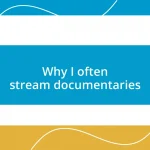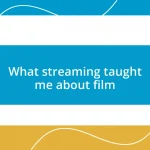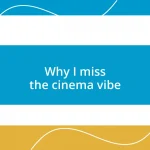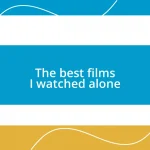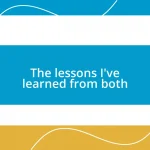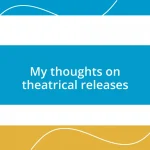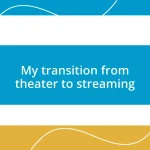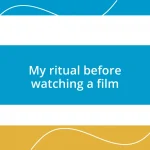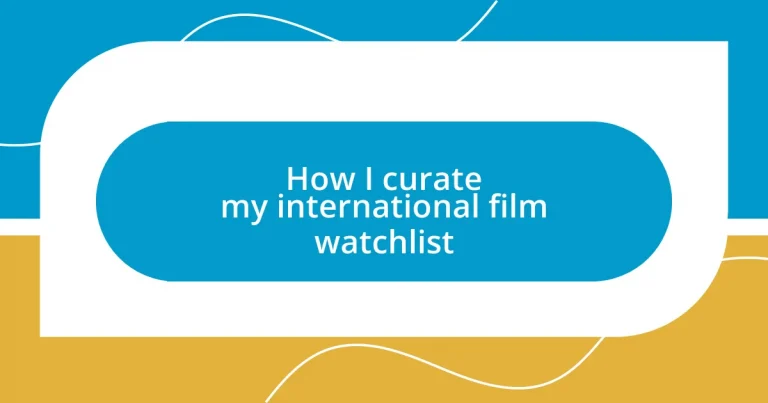Key takeaways:
- Personal film preferences are shaped by childhood experiences, emotional states, and cultural influences, highlighting the complexity of individual taste.
- Researching international film trends through festivals, social media, and film databases enhances appreciation for diverse storytelling and reveals emerging cinematic voices.
- Regularly updating and thematically organizing a watchlist not only reflects evolving tastes but also fosters a deeper connection to the films and stories from various cultures.
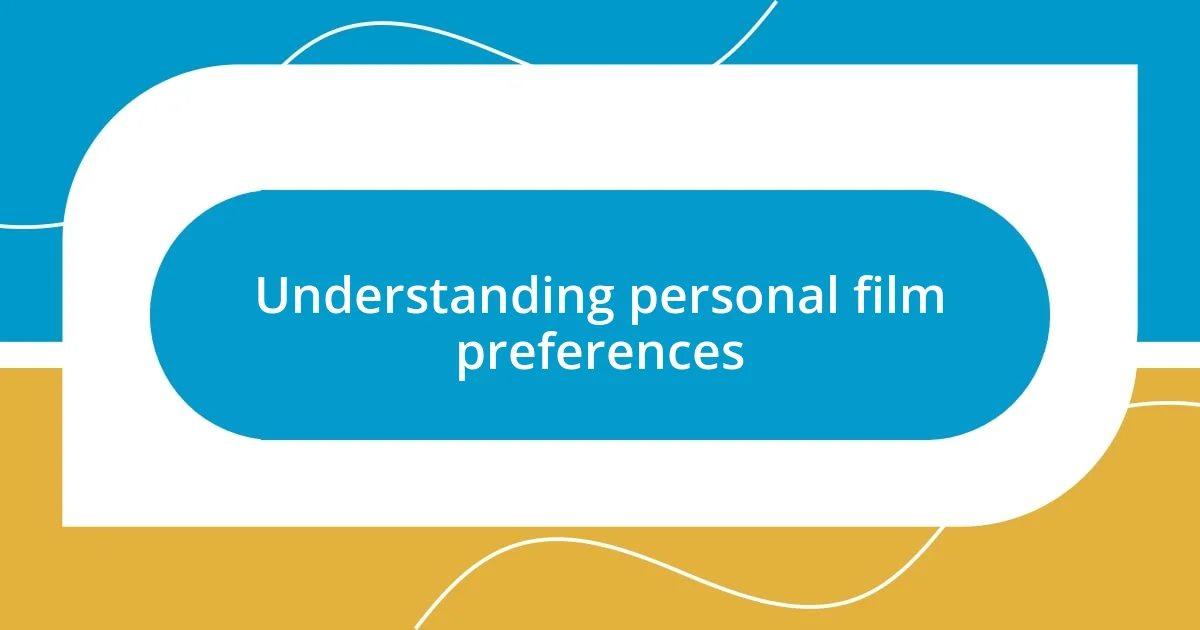
Understanding personal film preferences
Understanding personal film preferences can be a fascinating journey. I often reflect on how my childhood experiences shaped my taste in movies. Growing up, I was drawn to the whimsy of animated films, which ignited my imagination and sparked a love for storytelling. Have you ever noticed how your early favorites influence your current choices?
As I’ve explored different genres over the years, I’ve discovered that my mood greatly impacts what I want to watch. For instance, during tough times, I often seek out feel-good comedies. This isn’t just about entertainment for me; it’s a way to find solace and escape. I wonder if you also find yourself gravitating toward specific genres depending on your emotional state?
Cultural influences also play a significant role in shaping our preferences. I remember the first time I watched a French film; the nuances of emotion and style captivated me in a way that Hollywood hadn’t. It’s intriguing how films from different cultures resonate with us uniquely, reflecting our values and emotions. What about you? Have you ever watched a foreign film that changed your perspective?
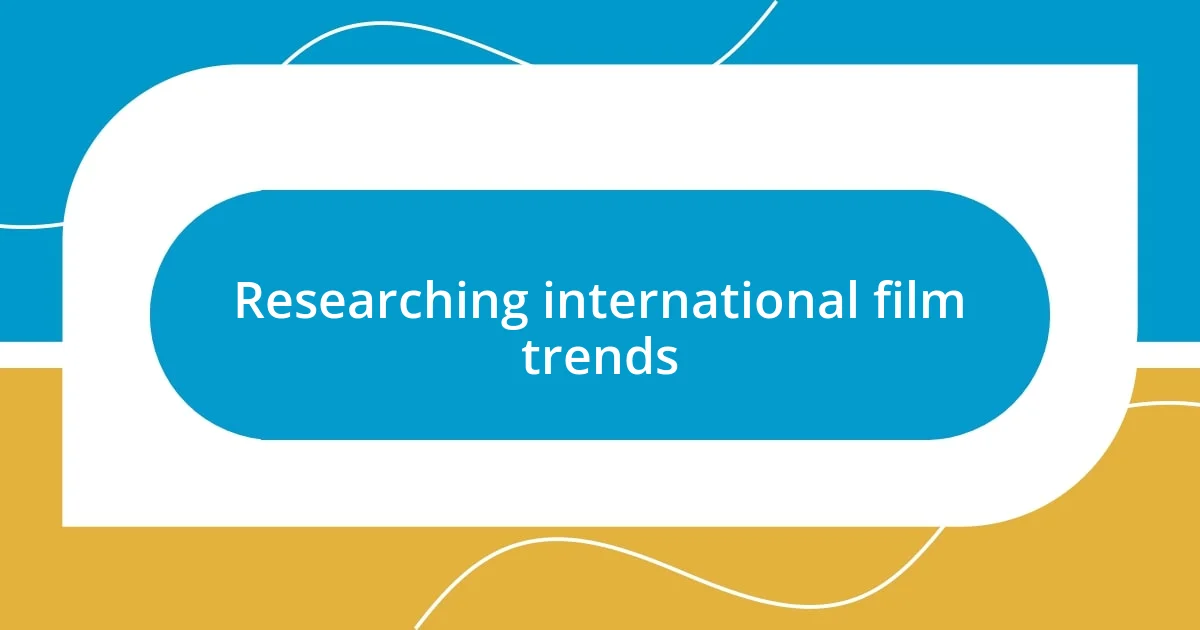
Researching international film trends
When I dive into researching international film trends, I find myself completely immersed in what’s happening around the globe. I love browsing through film festival lineups and online platforms that showcase different countries’ cinematic offerings. Just recently, I discovered a vibrant wave of Japanese indie films that beautifully capture contemporary youth struggles. They resonate with my own experiences of forging my identity, bringing those emotions to the forefront. This has not only broadened my watchlist but also deepened my appreciation for diverse storytelling.
Here’s a snapshot of how I track emerging trends in international film:
- Film Festivals: I keep an eye on major events like Cannes and Toronto, where many groundbreaking films debut.
- Social Media: Platforms like Twitter and Instagram are goldmines for discovering buzzworthy films and filmmakers.
- Online Forums: Engaging in discussions on sites like Reddit or specialized film blogs helps me gauge what others are excited about.
- Streaming Platforms: Services like MUBI curate international films beautifully, putting trends directly in front of me.
- Film Critiques and Reviews: I often read critiques from international film critics to gain perspective on the cultural significance behind trends.
By combining these sources, I get a fuller picture of the international film landscape. Each piece of information enriches my personal watchlist, allowing me to explore stories that might resonate deeply or challenge my viewpoints.
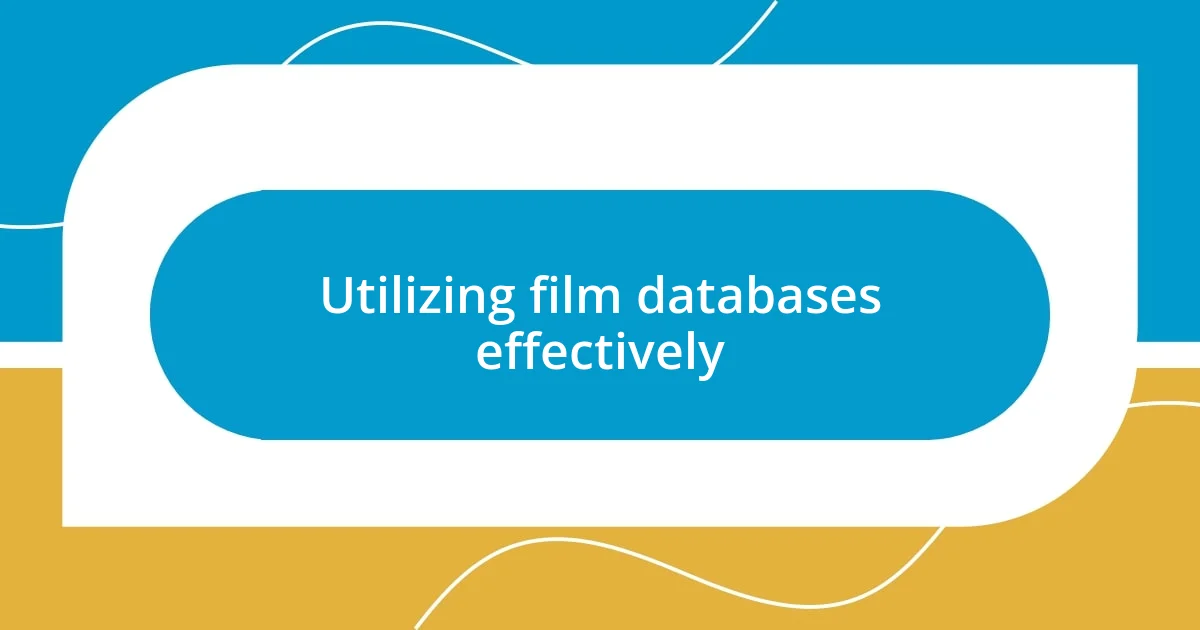
Utilizing film databases effectively
Utilizing film databases effectively is all about maximizing the rich information they offer. Personally, I rely heavily on platforms like IMDb and Letterboxd to deep dive into a film’s context, genres, and even user reviews. I remember stumbling across a hidden gem from Chile, primarily because a detailed review pointed out its thematic depth – it changed my entire perspective on South American cinema.
In my experience, filtering options in these databases can be a game changer. I often set criteria based on factors like director, release year, or even awards won. For example, looking at the Best Foreign Language Film nominees allowed me to discover several titles that I wouldn’t have considered otherwise. Have you ever focused on a specific country’s filmography during a particular decade? It’s fascinating how certain styles or stories emerge during those times, isn’t it?
I also love how user-generated lists on these platforms can guide my choices. When I see thematic lists like “Hidden Gems of Eastern Europe,” it inspires me to explore films I would never have known existed. I once found a poignant Slovakian drama that instantly became one of my favorites; it feels rewarding to share these discoveries with friends or on social media. Engaging with such databases truly enriches my film-watching journey, encouraging me to seek out diverse stories from around the world.
| Database | Features |
|---|---|
| IMDb | Extensive film information, cast and crew details, user ratings |
| Letterboxd | User-generated lists, reviews, social interaction |
| MUBI | Curation of international films, daily changing lineup |
| Rotten Tomatoes | Critics’ scores, audience ratings, trends |
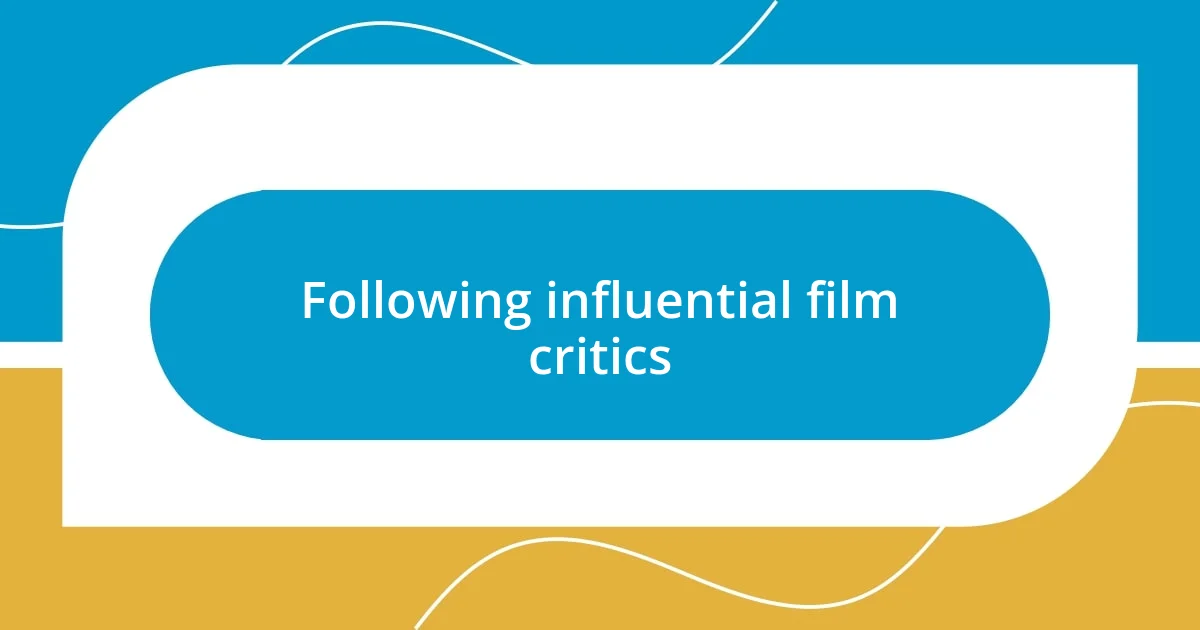
Following influential film critics
Following influential film critics has been a crucial part of how I build my international film watchlist. There’s something incredibly captivating about reading the thoughts of critics who have dedicated their lives to studying cinema. One particularly memorable moment was when I came across a review by a renowned critic discussing a little-known Iranian film. Their passion for the director’s unique vision made me curious enough to seek out the film, and it completely blew me away. Have you ever experienced that moment when a critic’s enthusiasm for a film ignites your own interest?
I also find that following critics on social media adds another layer to my experience. Engaging with their daily discussions keeps me updated on emerging talent and overlooked masterpieces across the globe. I remember one tweet from a critic that recommended a Mexican film simply because it pushed boundaries in storytelling. That resonated with me, and I eagerly added it to my list. To me, these interactions feel like having a chat with a friend who just gets my taste, guiding me toward films I might have otherwise missed.
Of course, not every critic will align with my taste, and that’s part of the beauty of the film community. The diversity of opinions challenges me to think critically about what I enjoy and why. I often ask myself, how does their perspective shape my understanding of a film? For instance, a critic’s take on a controversial Japanese animation introduced me to themes I had overlooked, ultimately enriching my appreciation for the medium. It’s this dialogue that transforms my watchlist from a simple collection of titles into a curated journey filled with context and nuance.
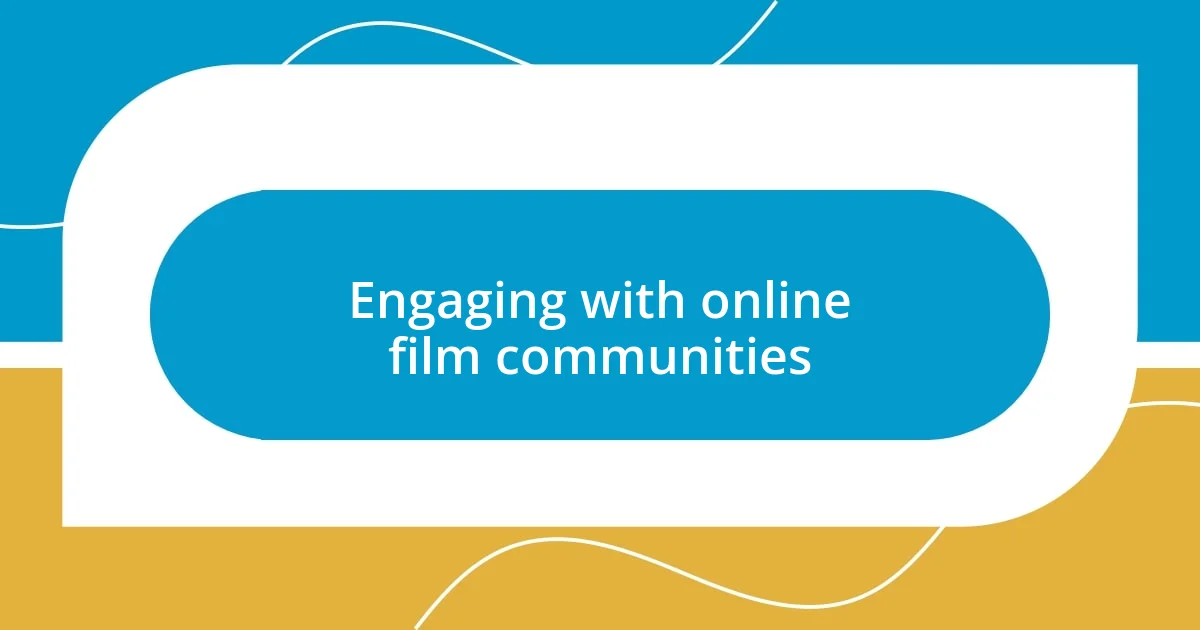
Engaging with online film communities
Engaging with online film communities has opened up a whole new world for me. I vividly recall joining a Facebook group dedicated to Asian cinema, where fellow members shared not only recommendations but also their personal stories tied to the films. One time, someone posted about a heartbreaking Thai drama, recounting how it mirrored their own life experiences. That connection made me dive deeper into the film, and I can’t help but wonder—how many other stories are hidden in films, just waiting for someone to share their journey?
I find that platforms like Reddit can be an absolute treasure trove. I remember participating in a thread where users debated the merits of different directors from Italy. The passionate exchanges sparked my interest in films I had previously dismissed. When someone passionately argued that a lesser-known Neorealist film captured the raw essence of human struggle like no other, I felt compelled to watch it. It’s moments like these that remind me of the sheer power of community dialogue in expanding my cinematic horizons.
Then there’s Instagram, where film lovers curate their accounts visually. I often stumble upon beautifully edited clips that reflect thematic elements or cinematography in a way that intrigues me. Recently, I discovered an account dedicated to classic African cinema, and watching their posts left me in awe of how much I had been missing. Engaging with these communities not only enriches my watchlist but ignites a deeper emotional connection to cinema—making me feel like I’m part of something much bigger than just a solo viewing experience. Have you ever felt that sense of belonging through a shared passion? It truly makes all the difference.
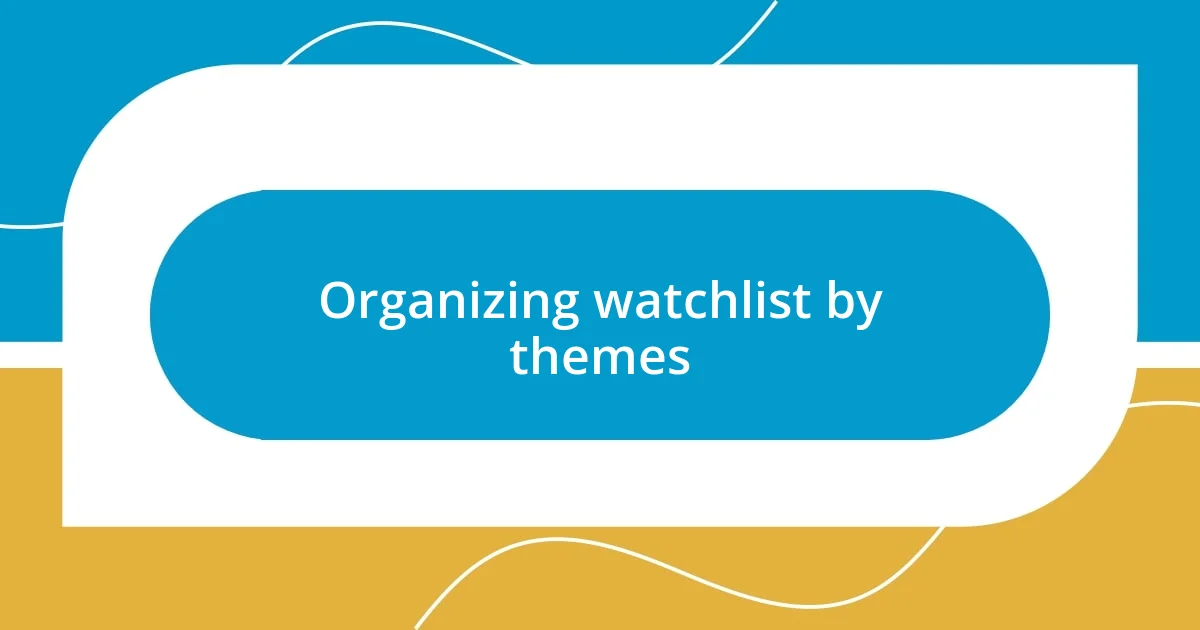
Organizing watchlist by themes
Curating my international film watchlist by themes has become a personal passion of mine. For instance, I love diving into films that explore cultural identity. One evening, I stumbled upon a collection of documentaries on the experiences of diaspora communities. Watching these films not only educated me about different struggles but also made me reflect on my own identity. How often do we see ourselves in stories that resonate on a deeper level and help us understand where we come from?
Another theme I enjoy is the exploration of dystopian futures. I once set aside a weekend to binge a series of films depicting varied visions of a post-apocalyptic world. Each film was not just a stark warning about our potential path but also a mirror reflecting societal issues we face today. It’s fascinating how a single theme can connect films from different cultures and eras, making me think—what do these filmmakers believe our world could become?
Finally, I also focus on films that feature strong female leads or are directed by women. This emerged from my desire to uplift voices that have often gone unheard in cinema. I was particularly inspired after watching an Argentine film filled with complex female characters. Their struggles and triumphs felt so genuine that I found myself pondering the narratives we choose to tell. It touches on the question—how can diverse stories enrich our understanding of the human experience? Each themed pursuit has a way of adding layers to my watchlist, transforming it into a treasure trove of reflection and discovery.
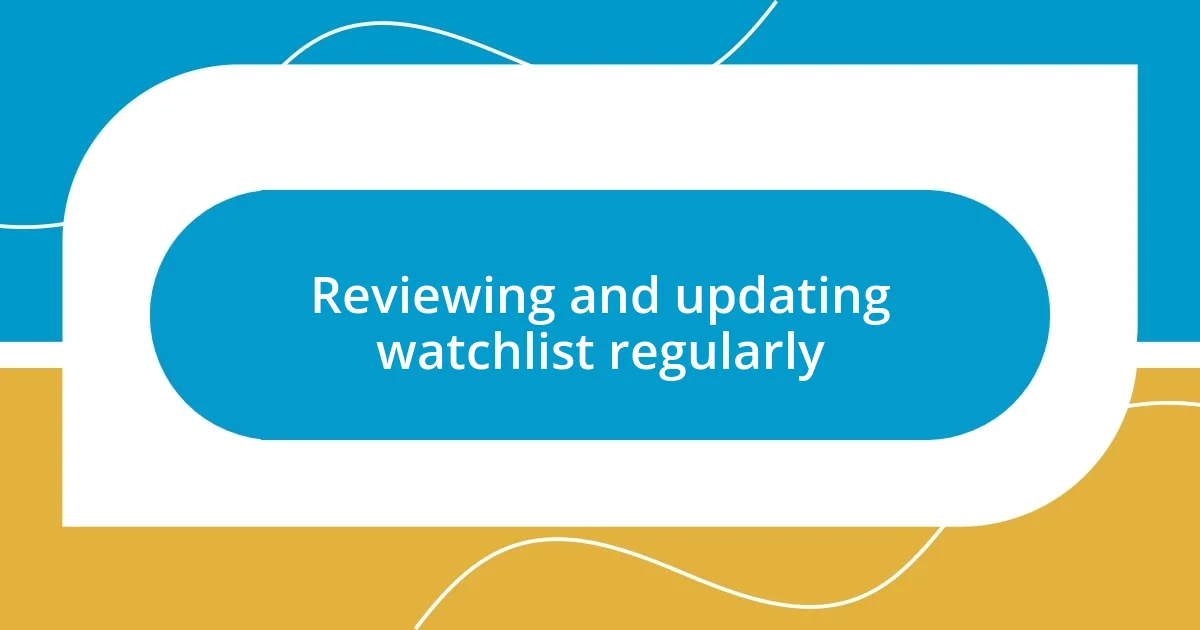
Reviewing and updating watchlist regularly
Regularly reviewing and updating my watchlist feels like tending to a garden. Each time I scan through, I encounter films that maybe didn’t resonate at first glance but suddenly seem relevant. Just the other day, I came across a German drama I had added a year ago; seeing its themes of resilience sparked something within me, prompting me to finally hit play. Have you ever unearthed a hidden gem that made you reconsider your choices?
I also find it crucial to remove films that no longer interest me. It’s liberating to let go of titles I added in a moment of curiosity but that haven’t stood the test of time. I remember a Moroccan film that initially intrigued me, yet after some reflection, I realized I was simply holding onto it out of obligation. Cleansing my watchlist not only creates space for fresh ideas but also clarifies my evolving tastes and interests—like a cinematic cleanse that leaves me rejuvenated.
Engaging with my watchlist has become a semi-ritual, reminding me of my intentions as a viewer. Recently, after a spontaneous film night with friends, I updated my list to include a few recommendations they made. Their enthusiasm for an Indonesian thriller reinforced my desire to explore the genre and added a touch of excitement to my screenings ahead. It’s moments like these that excite me about film, as I constantly discover how my watchlist evolves alongside my shifting preferences and inspirations.
